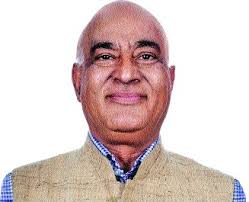Synchronised elections, voter behaviour, and governance outcomes
An active policy proposal of the Government of India is to hold national elections at the same time as the assembly elections of all the states. This article examines whether holding national and stat...
-
 Vimal Balasubramaniam
Vimal Balasubramaniam  Sabyasachi Das
Sabyasachi Das  Apurav Yash Bhatiya
Apurav Yash Bhatiya  28 August, 2020
28 August, 2020
- Articles
Political determinants of newspaper markets in India
Newspapers are an important source of political information for Indian voters. This article looks at how political factors influence the newspaper market. Using the announcement of delimitation in the...
-
 Julia Cagé
Julia Cagé  Guilhem Cassan
Guilhem Cassan  Francesca R. Jensenius
Francesca R. Jensenius  23 November, 2023
23 November, 2023
- Articles
A proposal for public funding of elections and political parties in India
The Finance Minister of India recently introduced measures aimed at cleaning up political party funding in the country. In this article, Gowda and Santhosh highlight the limitations of these measures,...
-
 M.V. Rajeev Gowda
M.V. Rajeev Gowda  Varun Santhosh
Varun Santhosh  21 April, 2017
21 April, 2017
- Perspectives
Ujjwala 2.0: What should be done next?
Stopping the use of wood and other solid fuels for cooking and other household uses is crucial to mitigating air pollution and its staggeringly high health impacts in India. In 2016, the government an...
-
 Ambuj Sagar
Ambuj Sagar  Alok Tripathi
Alok Tripathi  22 July, 2019
22 July, 2019
- Articles
Using mobiles to improve governance
Measuring how well major public programmes are implemented remains a core governance challenge. With the increasing mobile-phone penetration in the country, Muralidharan, Niehaus, Sukhtankar, and Weav...
-
 Karthik Muralidharan
Karthik Muralidharan  Paul Niehaus
Paul Niehaus  Sandip Sukhtankar
Sandip Sukhtankar  Jeffrey Weaver
Jeffrey Weaver  26 June, 2019
26 June, 2019
- Perspectives
India’s emerging crisis of representation
Article 81 of the Indian Constitution requires that each state receive Lok Sabha seats in proportion to its population and allocate those seats to constituencies of roughly equal size. However, the ch...
-
 Jamie Hintson
Jamie Hintson  Milan Vaishnav
Milan Vaishnav  29 May, 2019
29 May, 2019
- Articles
Power to the people: The impact of political report cards in India
How do Indian voters react to information on the qualifications and performance of politicians?
-
 Abhijit Banerjee
Abhijit Banerjee  27 May, 2019
27 May, 2019
- Podcasts
Criminal politicians and informed voting in India
In India, 9% of legislators face criminal charges. Could voter information and coordination improve the country’s political representation?
-
 Yusuf Neggers
Yusuf Neggers  23 May, 2019
23 May, 2019
- Podcasts
Curbing leakage in public programmes: Evidence from Direct Benefit Transfer policy for LPG subsidies
Many developing countries subsidise access to essential commodities with in-kind transfer programmes, where beneficiaries receive goods at subsidised prices while non-beneficiaries have to pay the mar...
-
 Prabhat Barnwal
Prabhat Barnwal  06 May, 2019
06 May, 2019
- Articles
Do roads bring votes in rural India?
A large-scale rural roads programme in India has provided access to over two-third of villages that lacked a paved road in 2001. Do citizens reward incumbent governments electorally for these improvem...
-
 Tanushree Goyal
Tanushree Goyal  26 April, 2019
26 April, 2019
- Articles
Oral democracy
Critical scrutiny of the challenges of electoral democracy including elite capture, corruption, and patronage has led to a revival of the idea of direct democracy – giving power directly to groups o...
-
 Vijayendra Rao
Vijayendra Rao  Paromita Sanyal
Paromita Sanyal  24 April, 2019
24 April, 2019
- Articles
Are transparency and accountability enough? Open corruption and why it exists
While India’s federal anti-corruption ombudsmen have just taken up their work, awareness of the complexity of corruption is growing. This article studies whether highly accountable Indian village co...
-
 Dahyeon Jeong
Dahyeon Jeong  Ajay Shenoy
Ajay Shenoy  Laura Zimmermann
Laura Zimmermann  18 April, 2019
18 April, 2019
- Articles
Should civil servants be allowed to serve in their home areas?
Bureaucrats form an essential part of State capacity. Should they be allowed to serve in their home areas? This article finds that Indian Administrative Service officers assigned to their home states ...
-
 Marianne Bertrand
Marianne Bertrand  Robin Burgess
Robin Burgess  Guo Xu
Guo Xu  08 April, 2019
08 April, 2019
- Articles
Strengthen MNREGS to support the rural economy
India’s Mahatma Gandhi National Rural Employment Guarantee Scheme (MNREGS) has generated a lot of controversy about its effectiveness as a safety net designed to benefit landless rural households. M...
-
 Karthik Muralidharan
Karthik Muralidharan  Paul Niehaus
Paul Niehaus  Sandip Sukhtankar
Sandip Sukhtankar  22 March, 2019
22 March, 2019
- Perspectives
Rethinking cadre allocation procedures in civil services
The allocation procedure of All-India Services’ officers to states is an important aspect of personnel administration in the public sector. This article shows that a change in allocation policy in 2...
-
 Ashutosh Thakur
Ashutosh Thakur  18 March, 2019
18 March, 2019
- Articles
Twitter feed
Tweets by Ideas4IndiaMost Popular Governance Posts
Unique Health Identification and Aadhaar: A case for mandatory linkage
As part of the Digital India initiative, All India Institute of Medical Sciences (AIIMS) issues a Unique Health Identification (UHID) number to each patient, which documents their entire journey in th...
 Mudit Kapoor
Mudit Kapoor  23 December, 2016
23 December, 2016
- Perspectives
Caste dominance in rural India: Cause and effect
Rural India remains a caste-based society. This column explores why caste continues to play such an important role and what the effects are. It argues that trade and agricultural productivity suffer, ...
 Siwan Anderson
Siwan Anderson  16 August, 2012
16 August, 2012
- Articles
Why did the Indian economy stagnate under the colonial rule?
How did the Indian economy fare under the colonial rule? Is the average Indian significantly better off after Independence? This column examines trends in GDP per capita in order to determine the stan...
 Aniruddha Bagchi
Aniruddha Bagchi  16 September, 2013
16 September, 2013
- Articles





 16 November, 2023
16 November, 2023






